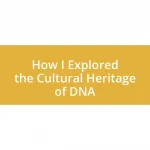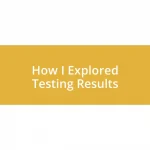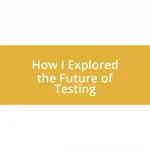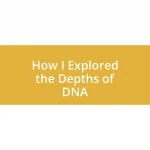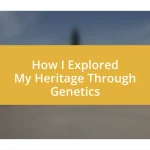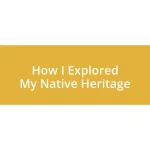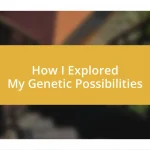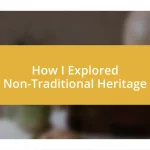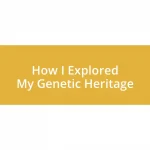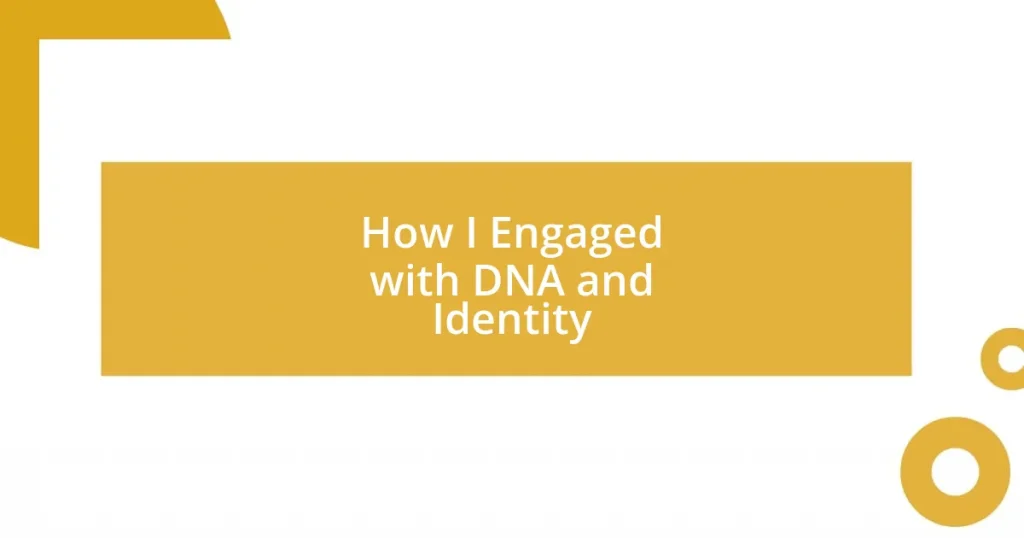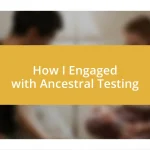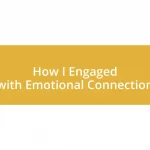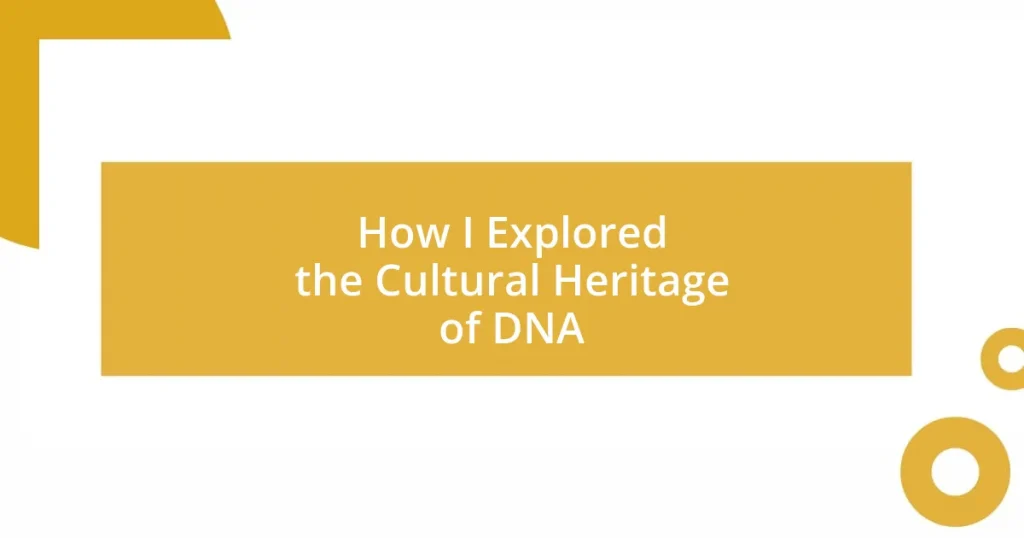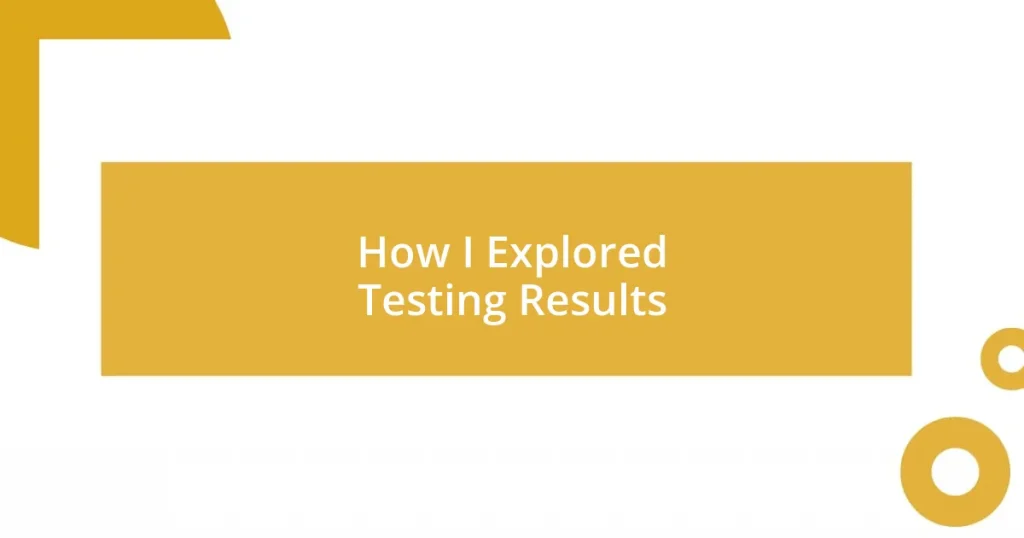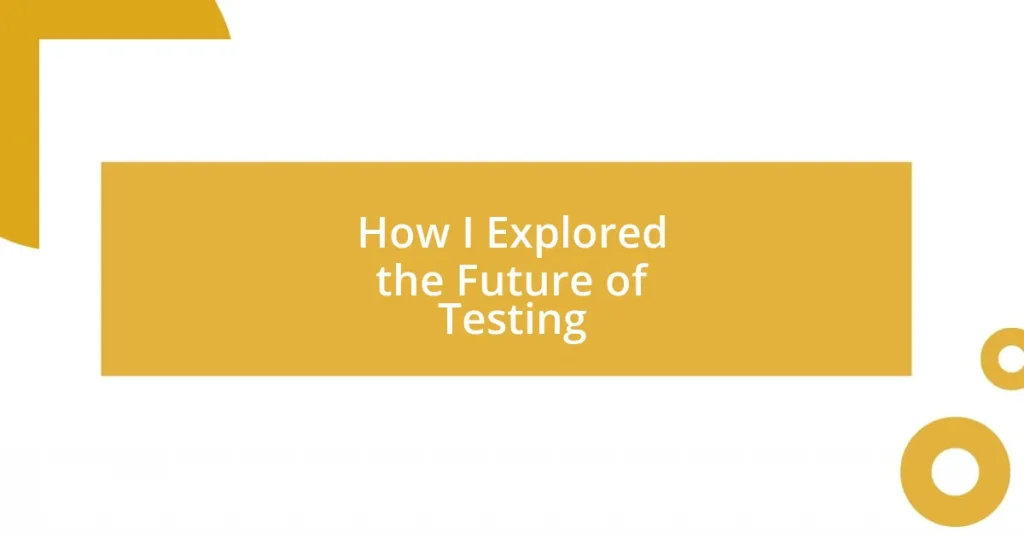Key takeaways:
- DNA shapes both physical traits and personal identity, connecting individuals to their ancestral roots while prompting reflections on cultural belonging.
- Genetic testing reveals unexpected ancestry, often leading individuals to reevaluate their identity and experience heightened emotional responses.
- Ethical considerations arise around privacy and the impact of genetic discoveries on family dynamics and personal narratives.
- Future trends in DNA engagement include increased accessibility of genetic testing and the potential emergence of community-based genetic projects to share and celebrate diverse heritages.
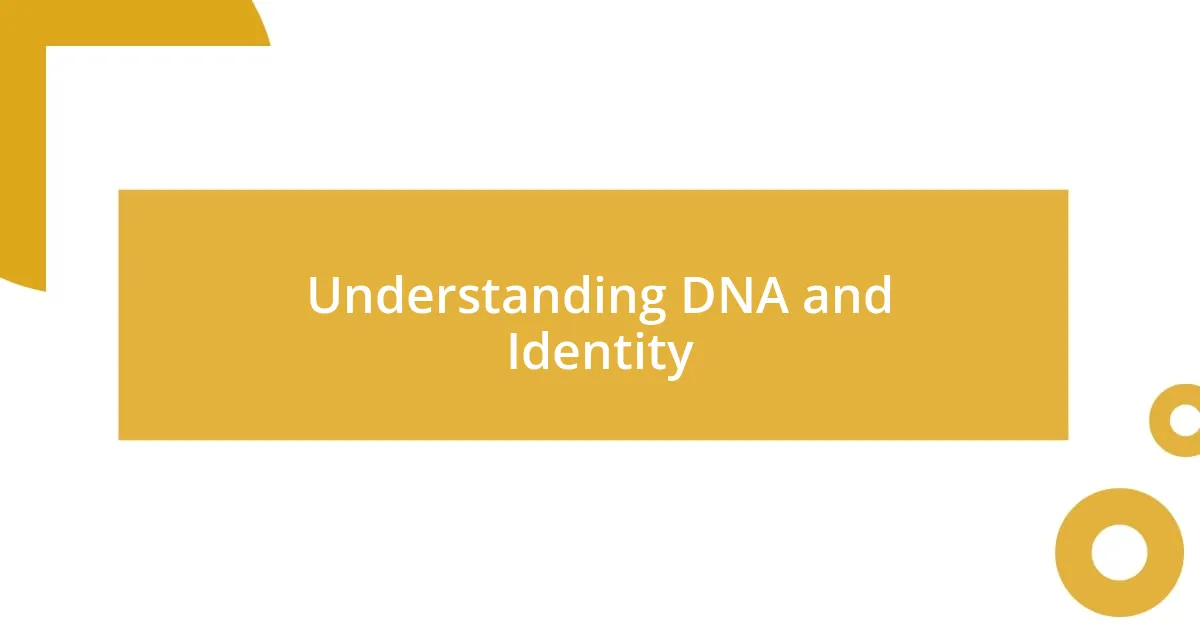
Understanding DNA and Identity
When I first delved into the relationship between DNA and identity, it struck me how intricately our genetic makeup influences who we are. Each of us carries a unique DNA blueprint that not only shapes our physical traits but also informs aspects of our health and behavior. Have you ever wondered how much of your identity is tied to those tiny strands of molecules?
I remember sitting down with my family and reviewing our genealogy, where we connected ancestral roots to our own traits. It was a revealing experience! I learned that certain traits, like my curly hair and even my quirky sense of humor, could be traced back through generations, grounded in our shared DNA. Isn’t it fascinating how we can find pieces of ourselves in the historical narratives of our ancestors, all encoded within our genetic material?
Understanding DNA also goes beyond mere traits; it invites us to reflect on identity in broader terms. I find myself pondering questions like, “What does it truly mean to belong?” In the context of genetics, our DNA might suggest certain physical ties to family, but identity is deeply personal and shaped by experiences, culture, and choices. This intricate dance between our genetic identity and our individual experiences is what makes each of our stories uniquely compelling.
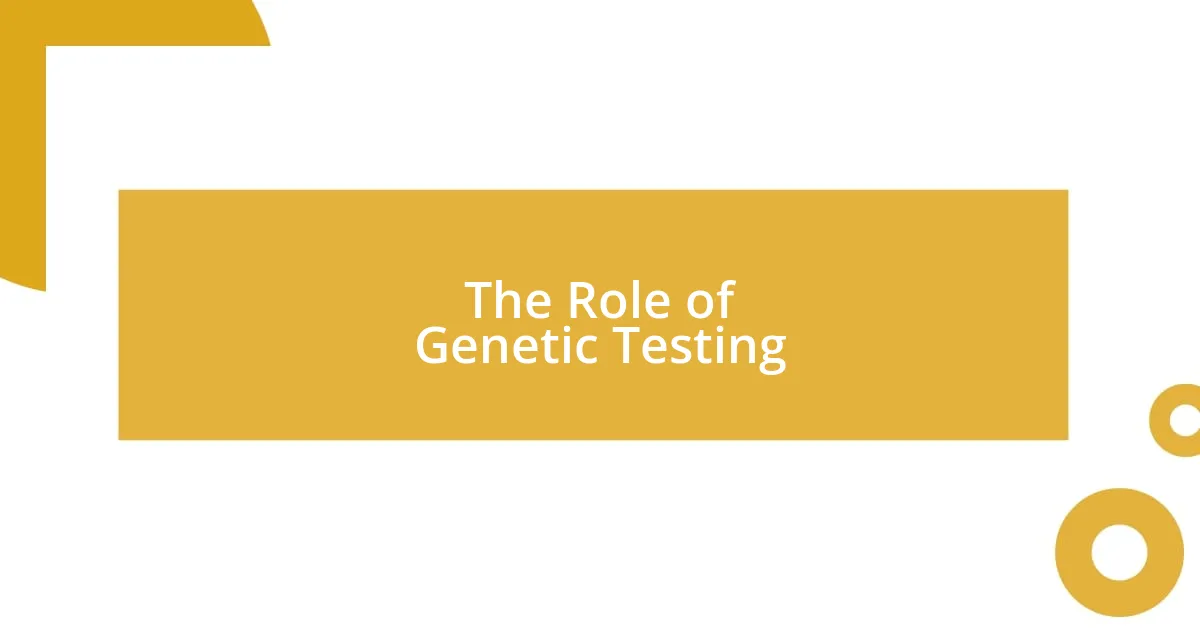
The Role of Genetic Testing
Genetic testing has transformed our understanding of identity, often revealing surprising connections. I remember when my friend Jennifer took a DNA test; she expected to find mostly European ancestry. Instead, she discovered a significant portion of her DNA linked to an Indigenous ancestry she had never considered. It caused her to rethink her identity in ways she hadn’t anticipated, influencing how she approached her heritage and her cultural ties.
The results from genetic testing can serve as a profound bridge to understanding ourselves better. I have seen individuals experience powerful emotional reactions upon learning about their lineage. For those who may have felt disconnected from their roots, this knowledge can be incredibly grounding, providing a sense of belonging that was previously missing. The information isn’t just numbers; it can lead to significant changes in how someone views their life story and personal narrative.
Interestingly, genetic testing also raises ethical questions about privacy and the implications of what we learn. As I navigated through my own exploration of genetic testing, I was continuously aware of how this information could reshape relationships and even lead to difficult discussions. What happens when hidden family ties come to light? These revelations can elicit a range of emotions, from joy to confusion, showcasing the complexities of identity intertwined with genetic information.
| Aspect | Genetic Testing Impact |
|---|---|
| Discovery | Uncovers unexpected ancestry and links |
| Emotional Response | Can evoke a deep sense of belonging or confusion |
| Identity Reevaluation | Opens up new perspectives on personal and cultural identity |
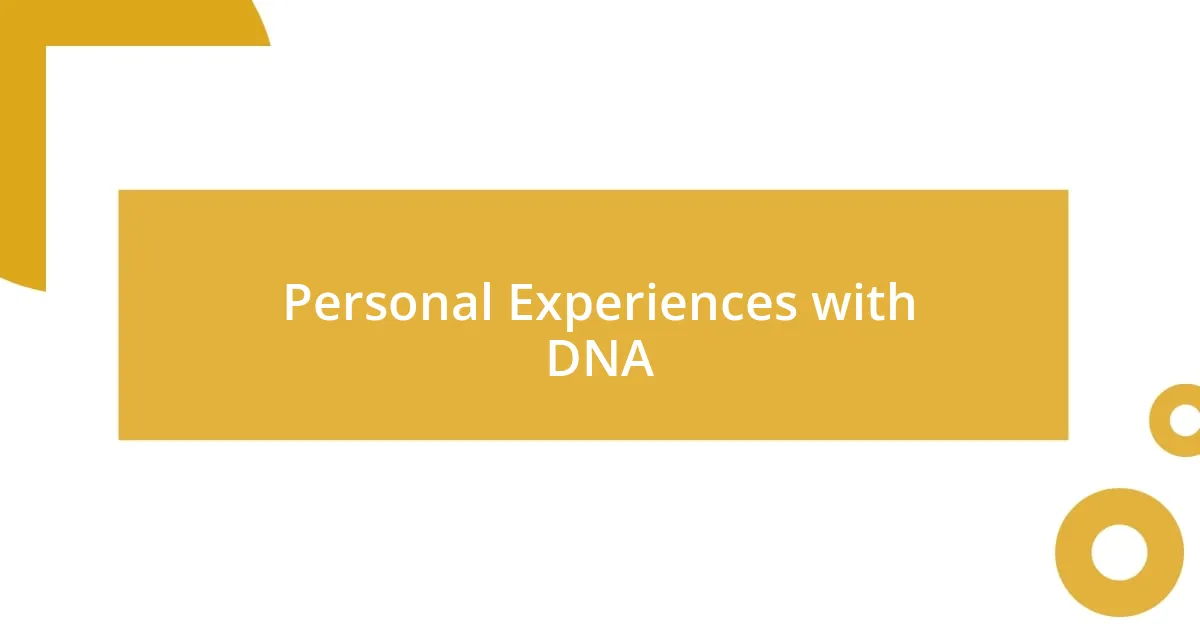
Personal Experiences with DNA
When I first encountered the concept of DNA testing, I was both excited and anxious. I distinctly remember the day I opened the results—I had always identified as primarily Italian due to my family’s stories, but the DNA results unveiled a surprising mix, including a hint of Scandinavian heritage. I felt a rush of curiosity about these newfound roots, prompting me to explore not just the facts but the cultures tied to those regions.
Here are a few reflections on my journey with DNA and identity:
- Discovering New Ancestry: The realization that my genetic makeup is more diverse than I imagined sparked my interest to learn about Scandinavian traditions.
- Cultural vs. Genetic Identity: I’ve grappled with how much of my identity is shaped by my experiences versus my genetic background, which has led me to embrace a multicultural perspective.
- Fostering Connection: Uncovering this broader heritage has enabled me to bond with various communities, reinforcing the idea that identity is fluid and multifaceted.
Another moment that left a lasting impact was the conversation I had with my grandmother after my DNA test. I remember watching her eyes light up as I shared my results. Her pride in our Italian heritage was palpable, but she was equally fascinated by the new information and began telling me stories of ancestors I had never heard before. It deepened our connection and reminded me of how interwoven our identities can be, framed not just by genetics but by the stories and history we carry forward.
- Strengthening Family Bonds: Our discussion opened the door for storytelling that had been dormant, bridging generational gaps in ways I never anticipated.
- Emotional Resonance: There’s an undeniable emotional richness in learning about where you come from; it feels like reclaiming pieces of your identity.
- Reevaluating My Narrative: This experience shifted my perspective on identity, suggesting that it evolves continuously as we learn about our roots and stories.
Each layer I uncover reveals not only where I fit in the tapestry of family but also how deeply interconnected our identities truly are.
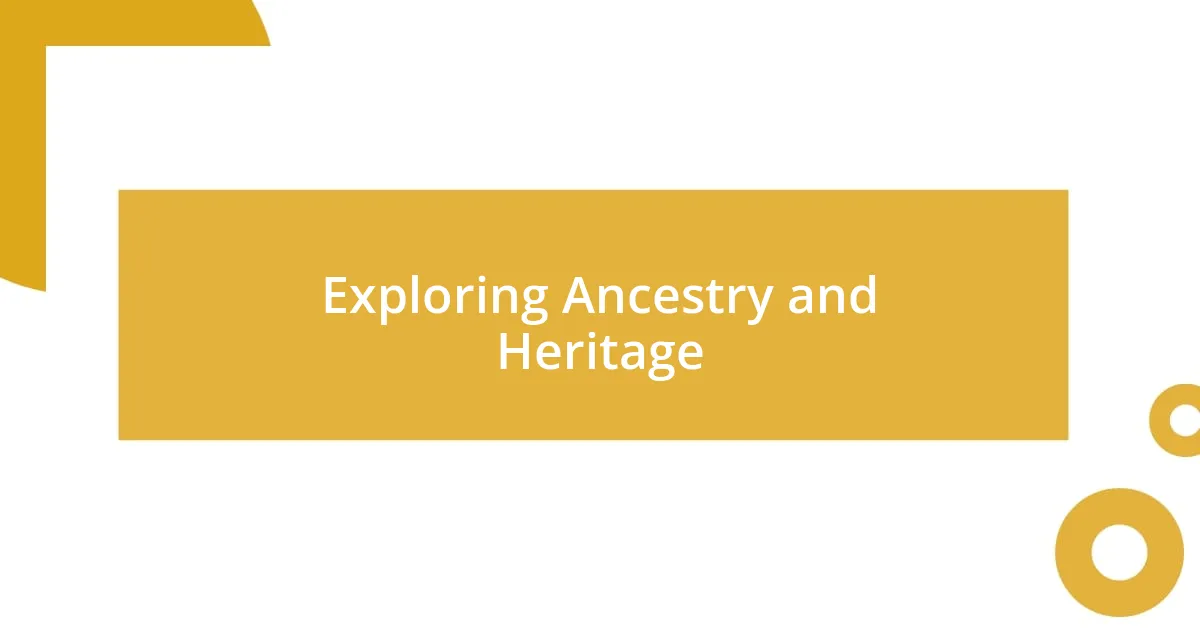
Exploring Ancestry and Heritage
The journey into ancestry is often filled with delightful surprises and profound revelations. I recall vividly the day I chatted with a distant cousin I found through my DNA results. We shared our family trees and, to my astonishment, discovered that our paths had almost crossed in the past—a family reunion we both had attended years ago without knowing we were related. It made me ponder: how many of these beautiful connections are waiting to be uncovered amidst the branches of our family trees?
Diving deeper into my heritage, I stumbled upon stories that filled me with a sense of pride and belonging. I learned about my great-grandfather who emigrated from Italy and how tough life was for him. Each tale I unearthed felt like a puzzle piece falling into place, giving me a clearer picture of the struggles and triumphs that shaped not just my family, but also me. It made me question how much of their strength lives on in me today. Reflecting on this, I realized that understanding where I come from can profoundly influence how I navigate my present and future.
As I explored the nuances of my heritage, I felt an additional layer of responsibility emerging—a desire to honor and celebrate those stories. I began incorporating traditions from my ancestry into my daily life, such as cooking recipes handed down through generations. This practice not only deepened my connection to my roots but also invited others to share in that experience. I often wonder: how can we ensure that these rich narratives continue to thrive in future generations, so they too can feel the warmth of their ancestry?
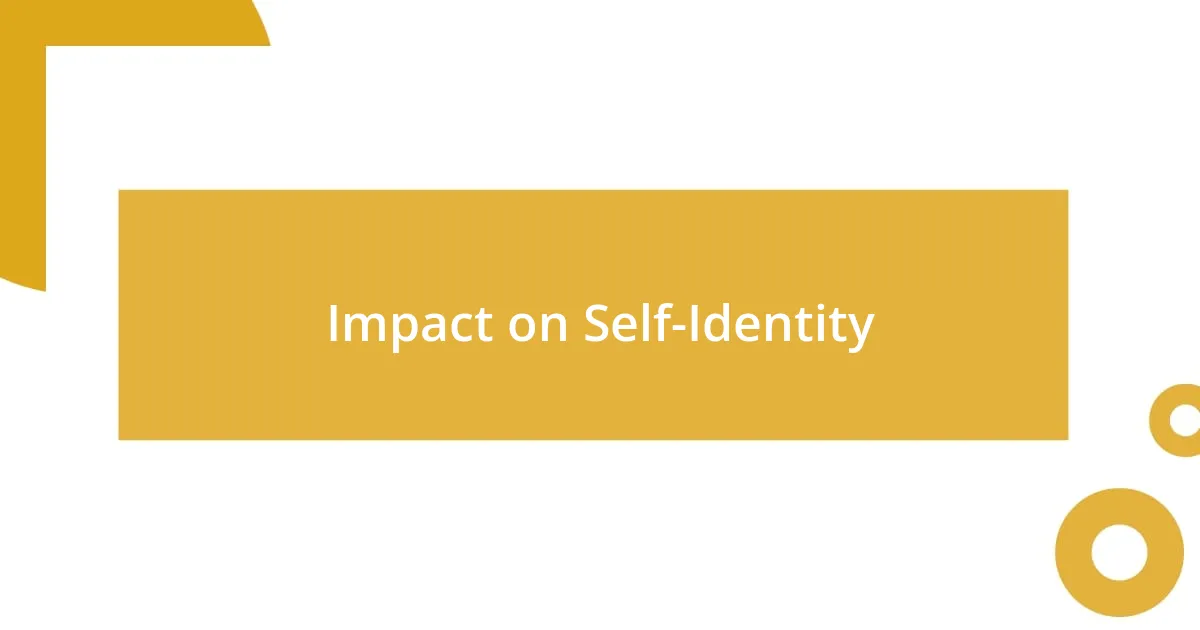
Impact on Self-Identity
Uncovering new aspects of my heritage reshaped how I view myself. I remember a moment where I cooked a traditional dish from my newfound Scandinavian roots. As I meticulously followed the recipe while my apartment filled with unfamiliar scents, I felt a connection that transcended time. It made me realize that food is more than sustenance; it’s a piece of identity, bridging the past with my present.
With every family story I learned, I felt an emotional weight lift off my shoulders. The histories of resilience, struggle, and joy weren’t just tales; they were threads woven into the fabric of who I am today. I started to ask myself how often I take for granted the experiences that have paved my path. This introspection has enriched my understanding of myself and my role in this lineage of stories—reminding me that our identities are crafted through both our bloodlines and our lived experiences.
I often reflect on how this journey has sparked a deeper appreciation for diversity within myself. My newfound awareness flows into my daily interactions, making me consider: how does one’s background shape their worldview? Embracing the idea that I am a mosaic of cultures not only enhances my sense of belonging but also encourages me to celebrate the beautiful differences in others. It’s a reminder that identity is not static; it’s alive, thriving through the stories we engage with and the connections we foster.
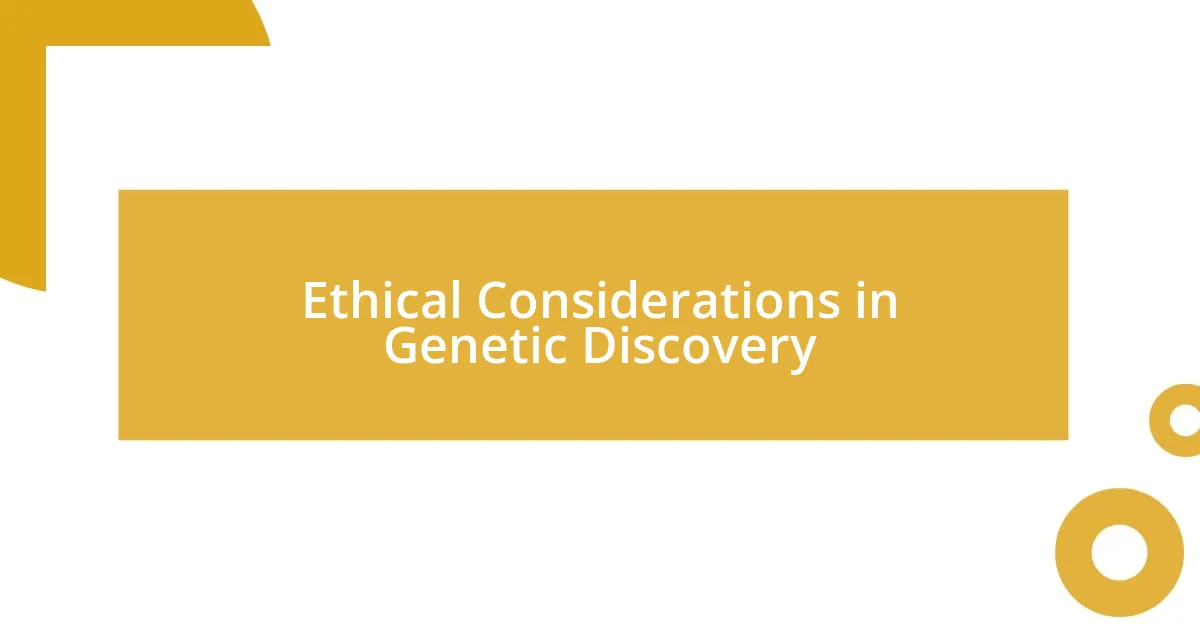
Ethical Considerations in Genetic Discovery
Ethical considerations in genetic discovery are incredibly nuanced, often triggering a mix of excitement and wariness. When I first learned about the possibility of genetic testing, I was captivated by the potential to uncover new facets of my identity. However, as I delved deeper into the subject, I began to ponder: what does it mean to possess information not just about myself, but also about my relatives? The implications of sharing genetic data can ripple through family dynamics, transforming our understanding of privacy and consent.
As I navigated my own findings, I confronted questions about ownership and responsibility. I recall feeling a twinge of unease when I discovered familial connections that had been previously unknown—did I have the right to share this information with others in my family? It made me realize that engaging with genetic discovery is not only about personal knowledge; it’s about how that knowledge impacts those around us. This dilemma often makes me ask: how can we ethically balance our curiosity for self-discovery with a respect for our relatives’ right to privacy?
Moreover, the possibility of uncovering genetic predispositions to certain health conditions introduces another layer of ethical complexity. I remember the intense mix of curiosity and concern I felt after receiving results indicating potential health risks. Instead of a straightforward path to better health, I was confronted with choices laden with ethical implications. It left me reflecting: how do we maintain a health-conscious approach while respecting the emotional weight such knowledge can carry? The journey through genetic discovery is not just about the science; it’s also a deeply personal exploration demanding careful consideration of its ethical dimensions.
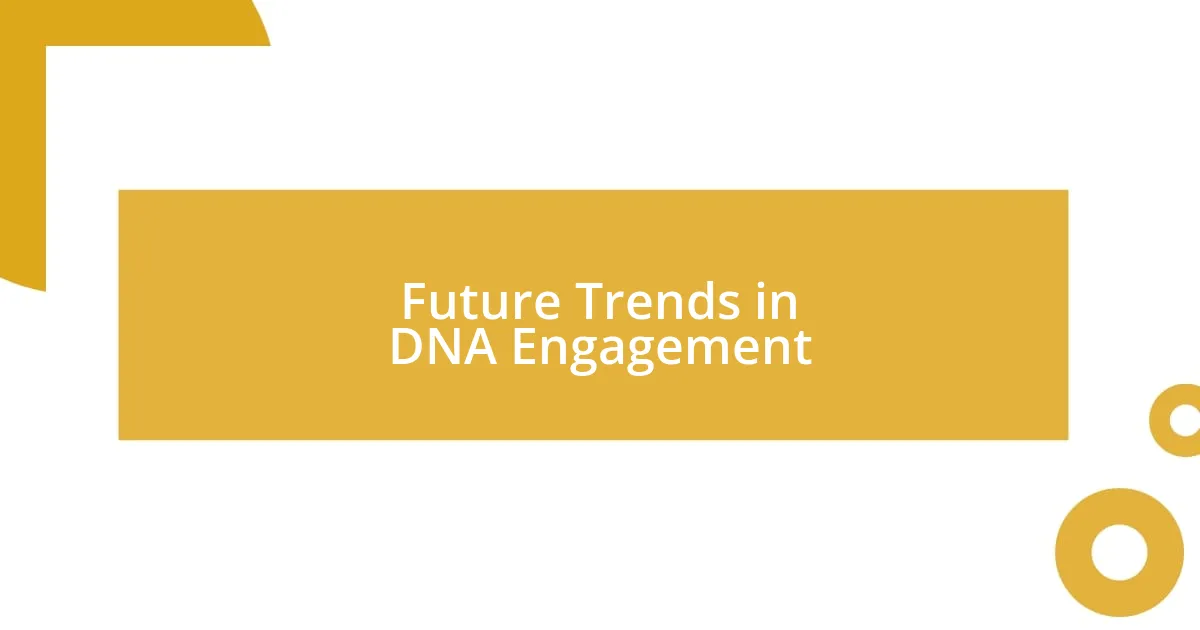
Future Trends in DNA Engagement
As I look into the future of DNA engagement, the rise of direct-to-consumer genetic testing is something that genuinely excites me. With advancements in technology, I see more people using these tools to explore their ancestry and health risks from the comfort of their homes. This democratization of genetic information feels revolutionary; it opens doors for countless individuals, including myself, to connect with our pasts and understand our health better. But I often wonder, how soon will we reach a point where every individual sees their DNA not just as data, but as a storyteller of their own unique journey?
Additionally, I believe that community-based genetic projects will become more prevalent. I envision initiatives where people gather to share their genetic findings, fostering a richer understanding of identity through community narratives. This collective approach could transform our perception of DNA from a personal secret into a shared tapestry of experiences. I remember a neighborhood potluck I attended, where stories were exchanged alongside dishes—imagine infusing that warmth with genetic insights! What if we could gather to weave our biological histories into our community fabric, celebrating both our commonalities and differences?
Moreover, I am increasingly aware of the ethical implications that will accompany these advancements. As technology becomes more accessible, the question of data privacy looms large in my mind. I often find myself wondering how we can ensure that those engaging with their genetic information are doing so safely and ethically. I’ve felt that mix of intrigue and anxiety when considering what it truly means to share such personal details. Moving forward, how do we navigate this path while respecting individual privacy and agency? It poses a challenge, but I believe it’s one we must thoughtfully address.
